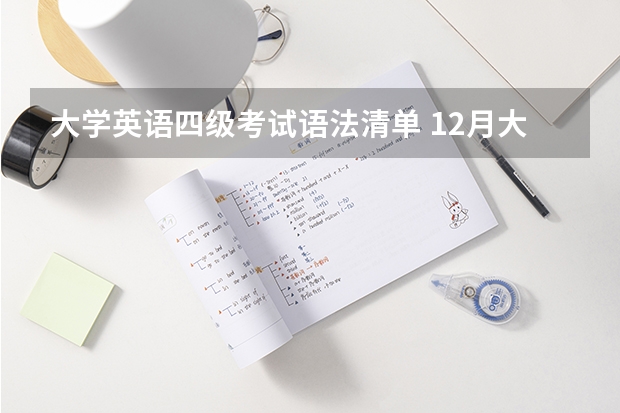大学英语四级考试语法清单 12月大学英语四级考试常用语法精选(十八)
2023-09-06 21:25:23 | 金大话英语培训网

2018年全国大学英语四级考试必备语法知识1
2018年全国大学英语四级考试必备语法知识1
as…as结构的几点用法说明:
1.基本用法
该结构的基本意思是“与……一样”,其中接形容词或副词的原级,在否定句中,第一个as也可换成so.如:
He doesn't study as [so] hard as his brother. 他学习不如他弟弟努力。 金大话英语培训网
2.涉及数量或程度的用法
若涉及数量或程度,可用“as much+不可数名词+as”和“asmany+可数名词复数+as”。如:
He doesn‘t pay as much tax as we do / as us. 他没我们交的税款多。
There are not as many restaurants as there were. 现在餐馆没有过去多了。
3.有关词序的一点说明
其间接形容词时,有时该形容词还可修饰另一名词,但这个名词应带有不定冠词(注意词序)。如:
I have as good a voice as you. 我的声音和你一样好。
4.该结构的修饰语
根据情况可用(not) nearly, almost, just, nothing like, exactly, not quite, half, one-ten, twice, threetimes, 30 per cent等修饰,并且这些修饰语必须置于第一个as之前,而不能置于其后。如:
This room is twice as large as that one. 这个房间是那个房间的两个大。
You‘re not half as clever us you think you are. 你远不是自己想像的那么聪明。
It took three times as long as I had expected. 这件事比我预料的多花了两倍的时间。
四六级英语推荐>>>

2020年6月大学英语四级语法考点复习整理
【篇一】2020年6月大学英语四级语法考点复习整理
英语四级语法考点复习:as often as
as often as及其他
一 as often as用于字面义,表示“与……一样经常”,可视为as…as结构与often的自然搭配;若用作习语,则表示“每当”。如:
I don‘t visit my parents as often as I should. 我去看望的次数不够经常。
As often as I tried to phone him the line wasengaged. 每次我给他打电话都占线。
另外,习惯搭配as often as not的意思是“往往”“通常”,不能按字面来理解。如:
As often as not, he forgets his homework. 他常常忘做家庭作业。
二 其他的还有:
as soon as字面意思为“与……一样快”;作为习语,其意为“一……就”。
as long as字面意思为“与……一样长(久)”;作为习语,其意为“只要”。
as well as字面意思为“与……一样好”;作为习语,其意为“不但……而且”“既是……也是”“而且”“还”。
【篇二】2020年6月大学英语四级语法考点复习整理
英语四级语法考点复习:interest
interested in doing和interested to do
有这样一道题:
You are right, we are not interested _________ tostories, but now we'd be interested _________ yourstory.
A. in listening, in hearing B. to listen, to hear
C. in listening, to hear D. to listen, in hearing
【分析】此题容易误选A,因为 be interested in 是大家很熟悉的结构,in 是介词,其后接动词自然应用动名词。但是,从句意来看,此题的答案应是C.为此请注意以下区别:
be interested in doing sth = 对做某事感兴趣(指一般性的动作)
be interested to do sth = 很有兴趣做某事,很想做某事(指尚未发生的动作)
如:He is interested in listening to stories. 他对听故事很感兴趣。
We'd be interested to hear your story. 我们很想听听你的故事。
请看一个类似的例子:
be keen on doing sth = 热衷于做某事(指一般性的动作)
be keen to do sth = 喝望做某事(指尚未发生的动作)
He is keen on playing tennis. 他很喜欢打网球。
I can't drive yet, but I’m keen to learn. 我还不会开车,但我很想学。
但是,以上用法是不可以随便推而广之的,因为并不是所有的“be + 形容词”都可同时接不定式或“介词 + 动名词”的。如:
(1)要表示“喜欢做某事”,英语可用be fond of doing sth,但不用be fond to do sth.
(2)要表示“忙于做某事”,英语可用be busy in doing sth,但不用be busy to do sth.
(3)要表示“厌烦做某事”,英语可用be tired of doing sth,但不用be tired to do sth.
(4)要表示“做某事做迟了”,英语可用be late in doing sth,但不用be late to do sth.
(5)要表示“做某事有经验”,英语可用be experienced at / in doing sth,但不用be experienced todo sth.
另外,对于可用于两个结构者,也不见得含义都有以上区别的。如:be fortunate in doing sth与befortunate in doing sth大致同义。
【篇三】2020年6月大学英语四级语法考点复习整理
英语四级语法考点复习:the用作副词
the用作副词的三种情形
以下用法的the有人认为是冠词,也有人认为是副词:
1、用于级前
Of all her friends, she likes Mary the best. 在她所有的朋友中,她最喜欢玛丽。
That was the most interesting story she had evertold. 这是她讲过的最有趣的故事。
She is the most suitable person imaginable. 她是能想像出的最合适的人选。
2、用于比较级前
表示某人或某物比以前更好或更坏,此时句中通常会有表示原因、理由或条件的短语或从句。如:
I feel the better for my walk. 散了一下步我觉得舒服多了。
I love him all the more for his faults. 正因为他这些缺点,所以我越发爱他。
3、用于“the +比较级,the +比较级”
表示“越……越……”。如:
The more a man has, the more he wants. 人越有越想要。
The higher up we go, the colder it becomes. 越往上走,天气就越冷。
The better I knew him, the more I liked him. 我越了解他就越喜欢他。

2010年12月大学英语四级考试常用语法精选(十八)
2010年12月大学英语四级考试常用语法精选(十八)1. 常考的几种倒装结构
1) 当表示否定或基本否定的词或词组位于句首作状语时用倒装。这类词或词组常用的有:never, nowhere, seldom, rarely, little, hardly, scarcely, barely, not until, not only, by no means, in no time, under no circumstances, under no condition, in no way, in no case, at no time, on no account等。
Never have I heard it before.
Nowhere can I find my lost watch.
Under no circumstance should a student cheat in the exam.
Not only was Churchill a statesman, but also a poet.
Note: 当 “no sooner … than”和“hardly/scarcely … when/before”位于句首时用倒装。该结构表示“一…就…”,在时态上主句一般用过去完成时,when或than引导的从句用一般过去时。
Hardly/Scarcely had I got home when/before the bell rang.
No sooner had the performance begun than the lights went out.
2) 当here, there, then, thus, only, hence, little等副词位于句首,句中主、谓用倒装。
Here is the book for you.
There goes the bell.
Then came the order to take off.
Thus arose the division between the developed and developing countries.
3) 当 “so/such … that”结构中的so或such 位于句首时用倒装。
So cold was it at night that I could hardly fall asleep.
Such was the force of explosion that all the windows were broken.
4) 分句以so, neither, nor, no more等副词位于句首,表明前面句子中所说明的情况也使用于后面的句子时用倒装。
Copper is a good conductor. So are many other metals.
He didn’t see the film last night, neither did she.
2. 强调句型
这里讲的强调句主要是以it为引导词的分裂句。其构成形式为:It is (was) +被强调部分+ that(who, which) + 句子的其他部分。被强调的部分通常为主语、宾语和状语。
It is only when one is ill that one realizes the value of health.
It is what you will do that is essential.
Note:
在被强调部分的后面,一般用that引出句子的其他部分。但是如果强调的部分是表示人的名词,那么也可用who;如果是指物的名词也可用which。
It was Jane that/who lent me the money.
It was this novel that/which they talked about last night.
如果强调的是原因状语从句,只能用because引导,不能由since, as或why引导。
It was because(不用since或as) he had never had the opportunity that John hadn’t learned to drive.
有三类句子成分不可以进行强调,即表语、谓语动词和由though, although, whereas等引导的从句。
It is although he is young that he can speak four languages. (误)
Although he is young, he can speak four languages. (正)
It is whereas he prefers pop song that I like classical music. (误)
I like classical music whereas he prefers pop songs. (正)
3. 使役动词后的宾语补足语
使役动词除了要有宾语之外还要加上宾语补足语才能使句子的意义完整。常用的使役动词有:have, want, make, get, leave, set, let等。可以担当使役动词宾语补足语的有名词,形容词,介词短语,动词不定式和分词等。
All work and no play makes Jack a dull boy.
A good night’s rest will set you right.
Note:
动词不定式可以担当使役动词的宾语补足语,但在make, let, have等使役动词后,动词不定式作宾语补足语时不用to。
He made her give up the opportunity.
What would you have me do?
Her pride would not let her do this.
分词也可以担当使役动词的宾语补足语。现在分词表示正在进行的主动意义,而过去分词表示已经完成的被动意义。
Her remark left me wondering what he was driving at.
The joke set them all laughing.
He managed to get the job done on time.
I’ve just had some new photos taken.
4. 平行结构
在英语中,当两个或两个以上的同等成分(主语,谓语,宾语,表语,定语,状语,宾语补足语等)并列时,要求它们的词性或结构相同,即名词对名词,介词短语对介词短语,分词对分词,句子对句子等等。这就是英语的平行结构准则。一般在使用并列连词如and, but, or, neither … nor, either … or, not only .. but also, both … and, more(less) … than, as well as,rather… than等时,要注意不要违反平行结构准则。
He likes watching TV more than reading books.
The soldier preferred to die rather than surrender.
We saw Tom walking towards the river, taking off his clothes and plunging into the water.
Censorship prevents a movie from being shown or a book being sold.
5. 反意疑问句
在具体运用反意疑问句时应注意以下几点:
1) 如果陈述句部分是一个含有宾语从句的复杂句,则反意疑问部分的谓语动词和主语代词要与主句的谓语动词和主语相对应。
He never said she would come, did he?
You told me I had passed the exam, didn’t you?
但是如果陈述句部分是 “I (don’t) think, believe, suppose, imagine, expect, fancy, reckon等+宾语从句”的结构时,反意疑问部分的谓语动词和主语代词要与宾语从句的谓语动词和主语相对应,并且要注意否定的转移。
I suppose you are not serious, are you?
She imagines that people like her, don’t they?
I don’t believe she knows it, does she? (因don’t的否定意义后移而不用doesn’t)
I didn’t expect she would come, would she? (因didn’t的否定意义后移而不用wouldn’t)
2) 如果陈述句部分是祈使句,则反意疑问部分一般用“will you”。在否定祈使句后还是用“will you”。
Read the text, will you?
Don’t be late, will you?
如果陈述句部分是以Let’s开头的祈使句,则反意疑问部分一般用“shall we”;如果是以Let us开头的祈使句,则反意疑问部分一般用“will you”。
Let’s have a party tonight, shall we?
Let us go home, will you?
3) 如果陈述句部分带有never, nothing, nowhere, hardly, scarcely, seldom, rarely, barely, little, few等否定词或半否定词,反意疑问部分的动词要用肯定式。
You can hardly believe this, can you?
He has few good reasons for staying, has he?
6. 词序
当多个形容词共同修饰一个名词时,在意义上同名词关系最密切的词最靠近该名词,其排列次序为“A + B + C + D + E + F + G + 被修饰的名词”。其中:A. 表示年龄、新旧的形容词,如old, young等。B. 表示大小、长短、高低、重量的形容词,如little, big, long, heavy等。 C. 表示形态、形状的形容词,如round, square等。D. 表示颜色的形容词,如red, white, green等。E. 表示国籍、地区、出处的形容词,如British, southern, Italian等。F. 表示物质、材料的形容词,如wooden, rocky等。G. 表示用途、类别、目的、与…有关等的形容词,也包括起形容词作用的名词和分词,如medical, writing, geography等。其他形容词放在上述A类形容词之前。例如:
a small round brown wooden table
a useless, old, big, heavy, red geography book
a valuable old French writing desk
a strong young Chinese boy student
7. 一些特殊的句型
1) there is no point in doing sth.
该句型意为“做…是无济于事的/没有什么用的”。可以用very little 或not much等来代替no。其中的point是不可数名词,作“目的”、“用处”解。
There is very little point in arguing with him.
2) have difficulty (or trouble) in doing sth.
该句型意为“做…有困难”。其中的in可以省略;其中的difficulty和trouble是不可数名词,不能有复数形式。也可以用there is difficulty(or trouble) in doing sth.表达相同的意思。
There was little difficulty in finding him.
3) keep (sb. or sth. ) busy doing sth.
该句型意为“使…一直忙着做某事”。需注意的是虽然busy with doing sth.和busy in doing sth.都是正确的,但考题中常考busy doing sth.句型。但如果busy后面跟的是名词,则要用busy with sth.。
We are busy preparing for the examination.
4) feel like doing sth.
该句型意为“想做某事”,且feel like后只能跟动名词,而不能跟动词不定式。此外,feel like后还可跟名词或代词,表示“想要某物”。
I was so angry that I felt like throwing something at him.
I feel like beer tonight. 以上就是金大话英语培训网小编为大家带来的内容了,希望能够帮助到大家,了解更多四六级资讯敬请关注金大话英语培训网。

2020年6月大学英语四级语法考点复习整理【篇一】2020年6月大学英语四级语法考点复习整理英语四级语法考点复习:asoftenasasoftenas及其他一asoftenas用于字面义,表示“与……一样经常”,可视为as…as结构与often的自然搭配;若用作习语,则表示“每当”。如:Idon‘tvisitmyparentsasoftenasIshould.我

2010年12月大学英语四级考试常用语法精选(十八)2010年12月大学英语四级考试常用语法精选(十八)1.常考的几种倒装结构1)当表示否定或基本否定的词或词组位于句首作状语时用倒装。这类词或词组常用的有:never,nowhere,seldom,rarely,little,hardly,scarcely,barely,notuntil,notonly,bynomeans,inn

2021年上半年英语四级语法用法指导【#四六级考试#导语】九层之台,起于垒土;千里之行,始于足下。备考的路上,哭过、累过、笑过,但只要坚持向前走,终将会拿到属于我们的证书。以下是整理的“2021年上半年英语四级语法用法指导”!祝大家备考顺利!【篇一】2021年上半年英语四级语法用法指导英语四级语法用法辨析:apologize与apology的用法一、apologi

英语四级考哪些词汇?四级词汇大多数都是高中词汇,高中要求的单词量是4500,大学四级要求的词汇量是6000,其中的4500个就是高中词汇,只是有些词变了一个意思或者是用法变,另外还需要1500个单词。大学英语四级考试,即CET4,是由国家教育部高等教育司主持的全国性教学考试。考试的主要对象是根据教育大纲修完大学英语四级的在校专科生、本科生或研究生。四级英语报名条件1

2020年6月大学英语四级语法考点复习整理【篇一】2020年6月大学英语四级语法考点复习整理英语四级语法考点复习:asoftenasasoftenas及其他一asoftenas用于字面义,表示“与……一样经常”,可视为as…as结构与often的自然搭配;若用作习语,则表示“每当”。如:Idon‘tvisitmyparentsasoftenasIshould.我

大学英语四级对语法的要求大学英语四级的语法主要有虚拟语气,主谓一致,独立主格,名词性从句以及时态等等,四六级是不直接考察语法,但是听力中需要听句子,阅读中需要句子,作文中需要写句子,而语法是句子的骨架,有句子的地方就有语法,所以语法基础是四六级做题之根本。虚拟语气:强调说话人的主观愿望和假想情况。考生应着重复习能引起虚拟语气的某些介词、介词短语和连词;主语从句、宾语从句

四六级12月几号考试四六级12月10号考试。四六级考试每年有两次考试机会,分别在每年的6月和12月第二个周六考试,四级考试在上午举行,六级考试在下午举行。2023年下半年英语四六级考试时间为12月10日。四六级考试简介四六级考试是指大学英语四六级考试,由在校大学生、研究生参加的考试,英语四级考试合格(及考试成绩达425分及以上)方可报名英语六级考试。大学英语

2008年12月大学英语四级测试答案2008年下年12月英语四级考试试题答案(A卷)一、快速阅读1-7:33212248:challenged9:canbeproundof10:staysilent二、听力答案:A-B卷通用11-15:BADAC16-20:CADBC36、increasing37、phonomen38、seeing39、accustoms
- 2023年6级考试时间下半年 四级报名截止时间2023下半年 北京四六级报名时间2023下半年
- 求六级百度网盘资源😭😭 求大学英语四级历年真题下载地址,有没有好的推荐 我需要 四六级历年真题,百度网盘的链接有没有呀~求哥哥姐姐们分享
- 英语四六级大学几年级考 大学几年级可以考英语四级 四六级大几可以考
- 英语四六级考试作弊会有什么后果啊!
- 12月大学英语六级作文题目及范文(大学英语四六级考试写作题型分析及范文(5))
- 广东省四六级报名时间(广东英语四级考试时间)
- 广东省2022年下半年四六级英语考试疫情防控要求 辽宁2022下半年英语四六级口语考试考生防疫须知 六级考试核酸要求
- 英语六级多少分算及格?
- 江苏省四级考试时间 江苏四六级考试时间2023年下半年 江苏省2023年四六级考试时间
- 湖北四六级考试时间2023下半年(下半年湖北英语四六级考试安排)
- 全国大学英语四、六级考试的网址是什么?
- 每年四六级考试时间? 四六级出处 英语四级考试时间,英语六级考试时间
-
 大学英语四级模拟考试时间 全国大学生英语四六级考试时间几点
大学英语四级模拟考试时间 全国大学生英语四六级考试时间几点2023-09-26 16:32:43
-
 如何注册大学英语四级考试 英语4级如何报名
如何注册大学英语四级考试 英语4级如何报名2023-08-31 11:17:41
-
 2019年上半年全国大学英语四级考试成绩查询 6月英语四级成绩查询时间
2019年上半年全国大学英语四级考试成绩查询 6月英语四级成绩查询时间2023-08-30 22:51:35
-
 英语四级大学宿舍要求多少 英语四级报考要求
英语四级大学宿舍要求多少 英语四级报考要求2023-09-30 05:26:14
-
 中北大学英语四级考试时间 英语四级具体考试时间表
中北大学英语四级考试时间 英语四级具体考试时间表2023-09-25 10:06:26
-
 往年大学英语四级考试成绩 怎样查询英语四级过往成绩单?
往年大学英语四级考试成绩 怎样查询英语四级过往成绩单?2023-09-21 21:19:53